The top alternative to QuickBooks is NetSuite ERP because of its fast online accounting and invoicing features. Used by businesses of all sizes, this platform streamlines expense tracking, time tracking, bookkeeping, invoicing, and payment processing in one convenient interface.
QuickBooks is one of the most popular entry-level accounting solutions on the market. It has become one of the most popular go-to solutions for companies moving from Excel spreadsheets to full-fledged accounting software. But is QuickBooks the best accounting software? While it can definitely handle a good chunk of your daily accounting tasks and is undeniably one of the better solutions available, it still has limitations that may pose a problem for you operation-wise.
Whatever your reason may be for wanting to opt-out of QuickBooks, we have you covered. To help you find better-fitting accounting solutions for your operations, we’ve prepared a list of accounting software that rival QuickBooks in terms of features, interface, and value for money. We’ve even noted some reasons why you should choose each platform on the list over QuickBooks and vice versa. This way, you’ll have all the information you need to compare these solutions with each other. Hopefully, you’ll find the best one that can help streamline your operations better, especially at this time when every business investment must prove worthy as the pandemic calls for ultimate cost efficiency.

Top 10 Alternatives to QuickBooks
Accounting processes are becoming more and more complicated in today’s digital age. To top that, the Sage Practice of Now 2020 revealed that 79% of accountants say that customer expectations have expanded to include the provision of finance and business consultancy, while 86% noticed that clients are increasingly demanding greater flexibility. This shows that customers are expecting more from their accountants.
To have an edge against your competition, it is important now more than ever to invest in accounting software. These systems are more than just simple financial management tools. They’re part of your company’s overall strategy to achieve its most efficient potential, along with improving other business areas. By optimizing cash flow, monitoring expenses, and keeping a record of critical financial data, accounting software ensures your company stays at healthy financial levels.
Luckily, the accounting software industry continues to grow with more scalable, secure, and agile general ledgers towards 2021. Meaning, you’ll have your pick of tools other than popular solutions like QuickBooks that are just as capable of keeping up with the times and adapting to your unique requirements.
Keep in mind, however, that before you settle on a particular software solution, you should first have a goal in mind that you want to utilize your new accounting system for. For starters, it may be best to understand the emerging technologies that accounting professionals are investing in. Some of these include advanced and predictive analytics (21%), automation (20%,), AI (20%), and IoT (20). By considering these factors, you will easily be able to pinpoint which accounting tools can help you keep up with the demands of the industry today.
Emerging Technologies that Accounting Professionals Are Investing In
5G: 22
5G
%Advanced and Predictive Analytics: 21
Advanced and Predictive Analytics
%Automation (including RPA): 20
Automation (including RPA)
%Artificial Intelligence: 20
Artificial Intelligence
%Internet of Things (IoT): 20
Internet of Things (IoT)
%Human Augmentation (including wearables): 19
Human Augmentation (including wearables)
%Natural Language Processing (NLP): 17
Natural Language Processing (NLP)
%Virtual/Augmented / Mixed Reality: 17
Virtual/Augmented / Mixed Reality
%Blockchain: 16
Blockchain
%Source: Sage 2020
Designed byTo kickstart your browsing process, our team of software experts has come up with a list of top 10 alternatives to QuickBooks. This way, you can have a better idea of the other products you can choose from. In case you want to expand your options even further, you can also check out our list of popular accounting solutions.
What is QuickBooks?

QuickBooks is often preferred by small to medium companies opting out of Excel. Proof of its popularity is that an entire community of QuickBooks experts has flourished, third-party consultants who’ll help you maximize the use of the solution.
QuickBooks can be deployed on-premise or via the cloud, targeting businesses of any size, but mostly smaller companies. The software is the mother brand for different versions. You have QuickBooks Online, QuickBooks Pro and QuickBooks Enterprise. Collectively, they feature the software’s known attributes, namely, workflow automation and integration.
QuickBooks is regarded for syncing all business finance activities under a single dashboard that’s accessible to multiple users. However, this is now a standard for most accounting solutions. Its key features include actionable insights, automatic banking and tax calculations, dashboards and feeds, and mobile receipt capture.
What are the benefits you’ll get from QuickBooks?
- Better collaboration as it comes with an accounts management tool that lets you edit, create, and share data with other users
- Improved mobility because of its access-anywhere dashboard with customizable feeds and charts
- Increased accounting integrity through its automatic financial data synchronization
- Stronger data protection as it has security controls like cloud and Excel export backups, payment tracker, restrictions and error alerts
QuickBooks may be a good accounting software, but it’s not necessarily the best for all companies. For one, it lacks industry-specific features, so you might not be able to streamline your workflow the way you want to if you have particular accounting needs. Also, it has limited file size and data support, making it insufficient for high-growth businesses. The advent of more robust, flexible solutions gives you more room to cherry-pick in this category. Here, we have identified the top 10 alternatives to QuickBooks and highlighted their key benefits.
1. NetSuite ERP
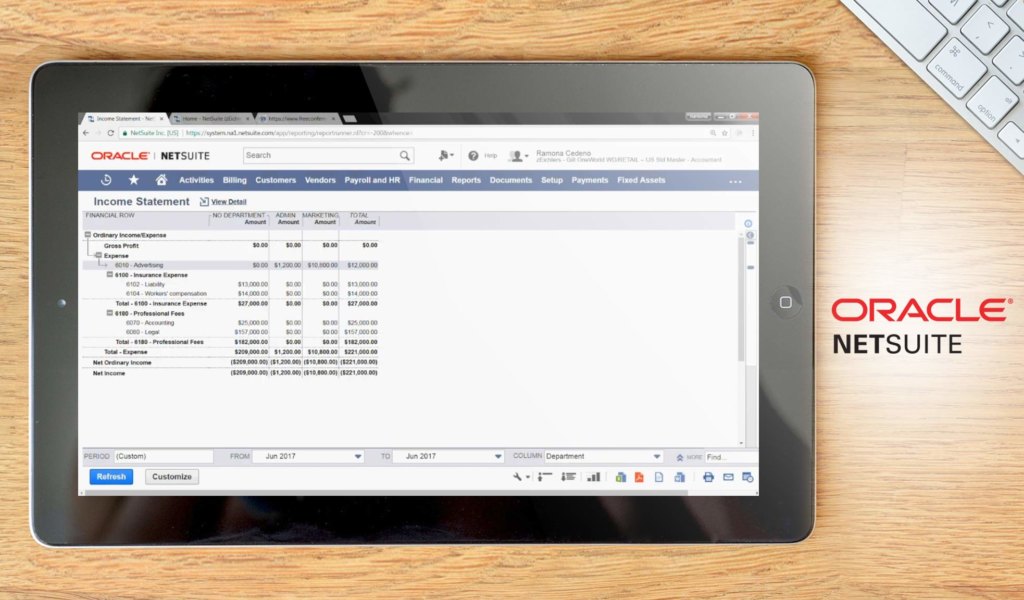
NetSuite ERP, as you can probably already tell by its name, goes beyond accounting systems. As an enterprise resource planning software, it covers quite a wide range of crucial business processes like purchasing and vendor management, warehouse management, and fixed asset management. Meaning, you can streamline different aspects of your operations and run them from a single place, making it a good option for fast-growing mid-sized businesses and large enterprises.
As part of the NetSuite product line, the ERP solution has smooth integration with the vendor’s CRM, ecommerce, and order management systems. This means you can easily combine all of the tools you need to carry out day-to-day operations. In case its native integrations are still not enough for you, NetSuite ERP can also connect with a wide network of third-party solutions such as Birst, Epay, and Bronto. Should you want to learn more about its features, NetSuite ERP offers a free demo.
NetSuite ERP gives you clear visibility across your supply chain with a set of inventory, manufacturing, and purchasing tools within your reach. It also speeds up the quote-to-payment cycle by streamlining the sales quote, order, invoicing, and payment workflows. The solution has more sophisticated features, including financial planning, revenue recognition management, and payroll services. You can find more NetSuite ERP alternatives here.
Why use NetSuite ERP instead of QuickBooks?
- NetSuite ERP meets the accounting processes of mid-level and large enterprises
- It has sophisticated features like vendor management, fixed asset management, and inventory control
- The platform provides more integrated accounting with its smooth integrations with other business processes like payroll, inventory, manufacturing
Why use QuickBooks instead of NetSuite ERP?
- QuickBooks can easily meet your core accounting needs
- It is a less expensive option if you don’t need an ERP system
- This has a lower learning curve compared to NetSuite ERP
Detailed NetSuite Review
2. Paychex
 Paychex is another cloud-based software that caters to businesses of all sizes. The platform offers fully integrated business solutions, including payroll, taxation, HR management, and more.
Paychex is another cloud-based software that caters to businesses of all sizes. The platform offers fully integrated business solutions, including payroll, taxation, HR management, and more.
For payroll processing, Paychex provides businesses with advanced tools that enable users to run their payroll online with just a few clicks or with the help of Paychex’s voice-activated technology. Paychex’s payroll automation extends further to tax calculations, payroll tax payments, and filing tax requirements with appropriate agencies. With this critical part of business operations fully automated, business owners and accountants can have more time to focus on other important tasks.
Other features Paychex offers are built-in attendance and time tracking, employee benefits management, and HR services. You can also seamlessly integrate Paychex with your existing software systems via Paychex API. In terms of cost, Paychex has three levels of subscription plans, with the most affordable one starting at $39 per month.
If you would like to know more about similar software solutions, you can check out these Paychex alternatives.
Why choose Paychex instead of QuickBooks?
- This software offers more sophisticated payroll automation capabilities.
- Paychex has more comprehensive tax administration and employee benefits management services.
- Paychex’s suite of solutions caters to more types of businesses across different industries.
Why choose QuickBooks instead of Paychex?
- QuickBooks has more extensive collaboration tools.
- This platform offers a higher level of workflow customization.
- QuickBooks has a more established brand reputation.
Detailed Paychex Review
3. Tipalti
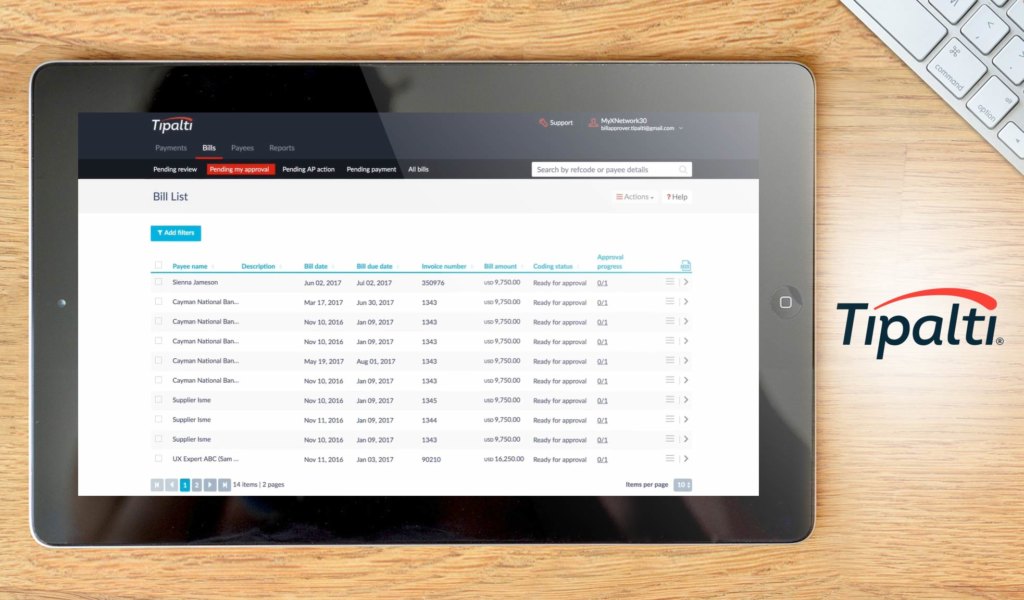
Tipalti is a payment management software that allows you to optimize the processing of global payables by providing you with end-to-end control over your AP workflow. It comes with invoice processing, instant payment reconciliation, and payment risk management so that you can accelerate your AP process without compromising data security. This platform can also process 120 currencies via PayPal, wire transfer, debit cards, ACH, and local bank transfers, making it a good option for international businesses.
To top it all off, Tipalti aims to strengthen your risk controls by operating in compliance with national and international taxation regulations. It is KPMG-certified and FATCA compliant, so you can rest assured that all of your accounts payables are being processed according to industry standards. If you think that this platform won’t be enough to handle your accounting responsibilities, you can also take a look at these great Tipalti alternatives. You can use all the features for free for a period of time to see if the software matches your needs.
Why use Tipalti instead of QuickBooks?
- Tipalti offers robust tools designed for payment processing
- This platform comes equipped with open API capabilities so that you can connect it to virtually any other application or business system
- It offers a custom UI, making it a good option for those who want full control over their accounting system
Why use QuickBooks instead of Tipalti?
- QuickBooks is a more well-rounded accounting solution
- It offers a more advanced reporting tool that can be customized and scheduled according to your preferences
- The vendor provides plans at different price points depending on your accounting software requirements
Detailed Tipalti Review
4. FreshBooks
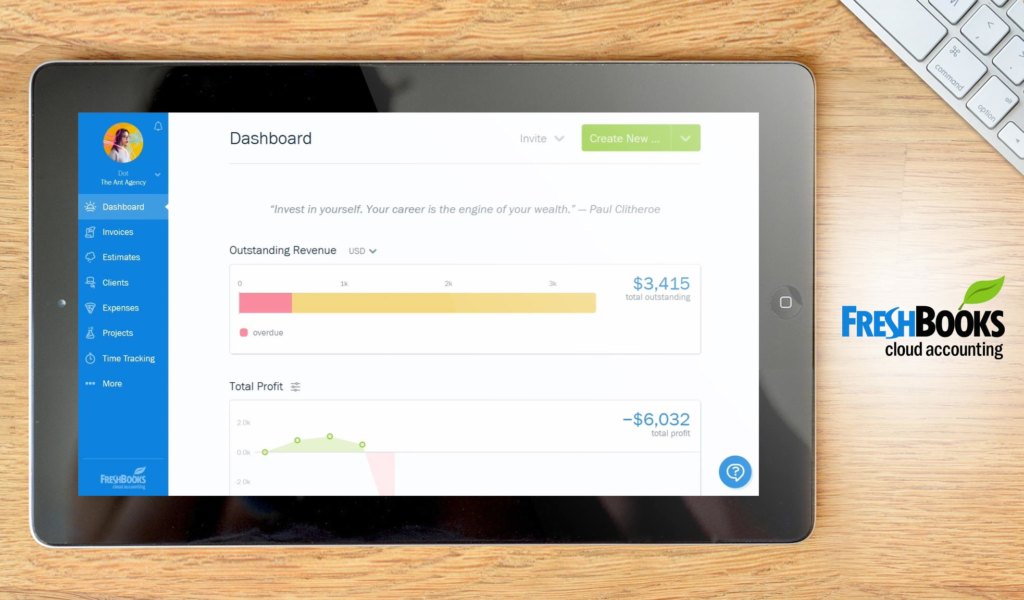
FreshBooks is an award-winning platform billed as one of the best cloud apps in this category. Our review experts thoroughly assessed its features and concluded that FreshBooks could turn complex financial management to a simple, smooth experience. If you want to try out the key features of the software, there is a great free trial plan that you should check out.
For one, the software allows businesses to manage invoices and track and collect payments from one platform, thus, fast-tracking the order-to-collection cycle. FreshBooks integrates smoothly with payment gateways like Google Checkout, PayPal, and major credit cards, as well as with many other business apps. You gain complete financial control without having to maintain a complex system. You can use all the features for free for a period of time to see if the software matches your needs.
Managing billing becomes easier, too, with FreshBooks. You can easily track current and previous invoices. Any unpaid or overdue invoice can be quickly pulled out from the system. More efficiently, an automated overdue payment can be set up to remind clients of their payments. This frees you from the stress of following up payments and, critically, keeps your cash flow healthy.
Moreover, FreshBooks’ Android and iOS mobile apps were noted to be exceptionally fully functional. One of its practical uses is taking image snaps of receipts for expense management, making expense liquidation simpler. Likewise, navigation is intuitive, and notifications against duplication or inconsistent inputs are in place. Automated task prioritization also lets you manage your time more efficiently and puts cash inflow at the top of your agenda. You can find more FreshBooks alternatives here.
Why use FreshBooks instead of QuickBooks?
- FreshBooks has a smoother functional design that includes an efficient invoice-to-payment process
- It offers better customization such as for triggers and alerts, file management workflow, expense assigned rates, and white labeling
- The vendor provides more affordable plans at $15 per month for up to five clients
Why use QuickBooks instead of FreshBooks?
- It’s part of the QuickBooks product lineup in case you plan to use other QuickBooks versions
- It has a more established name in terms of brand recall, having been in the market longer
- It comes with plenty of support from third-party consultants, but this entails separate charges
Detailed FreshBooks Review
5. AvidXchange
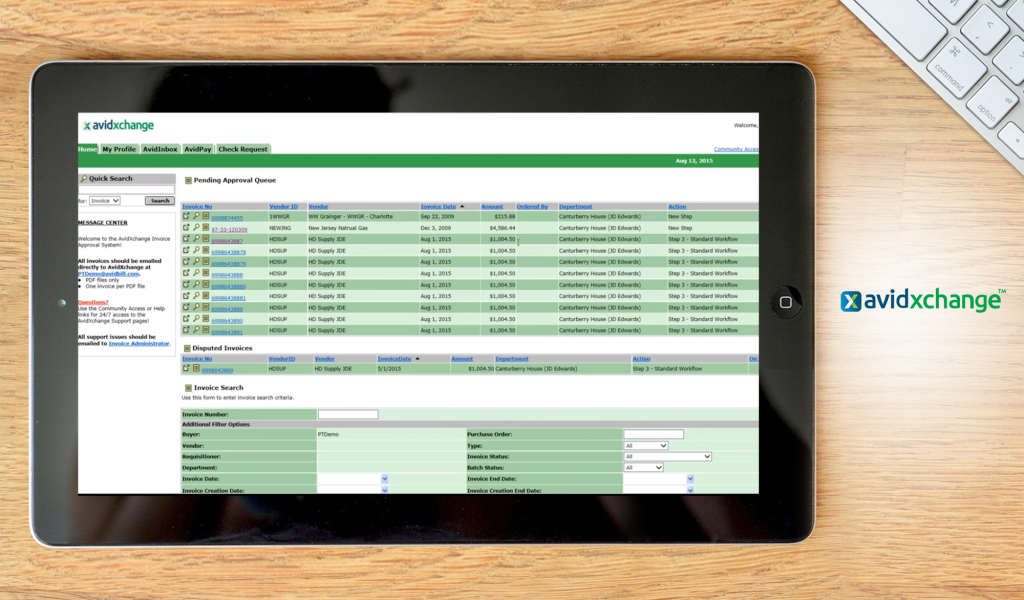
Designed for small and large enterprises alike, AvidXchange is an easy-to-use solution for invoice management and payment automation. It lets users optimize the entire accounts payable processes using cutting-edge automation features for payment processing, purchase order processing, as well as invoicing. With this, users can accelerate supplier payments as well as save on operational costs associated with manual data entry.
AvidXchange also comes with a highly configurable interface and powerful workflow automation options. Having this at your disposal allows you to create custom approval workflows and even set up recurring payments. Moreover, the platform has a supplier portal that makes it easy for them to relay invoicing information to their partner vendors. This creates a more convenient yet secure system for all business transactions.
Aside from the abovementioned functionalities, the platform also comes with advanced reporting features to help you review your transactions and processes. For instance, it can generate reports on approval cycle times and performance metrics as well as give you a comprehensive invoice history.
In any case, you may check out these AvidXchange alternatives for other options.
Why use AvidXchange instead of QuickBooks?
- The platform has fraud detection features to help you make sure that all transactions are legitimate.
- It has built-in payment automation and bank reconciliation tools.
- It has its own supplier portal to make vendor payments faster.
Why use QuickBooks instead of AvidXchange?
- QuickBooks can be deployed either on-site or via cloud.
- The software also has a simple dashboard but comes equipped with mobile receipt capture, actionable insights, and the like
- The platform comes in more iterations/versions to suit a wider range of users.
Detailed AvidXchange Review
6. Plooto
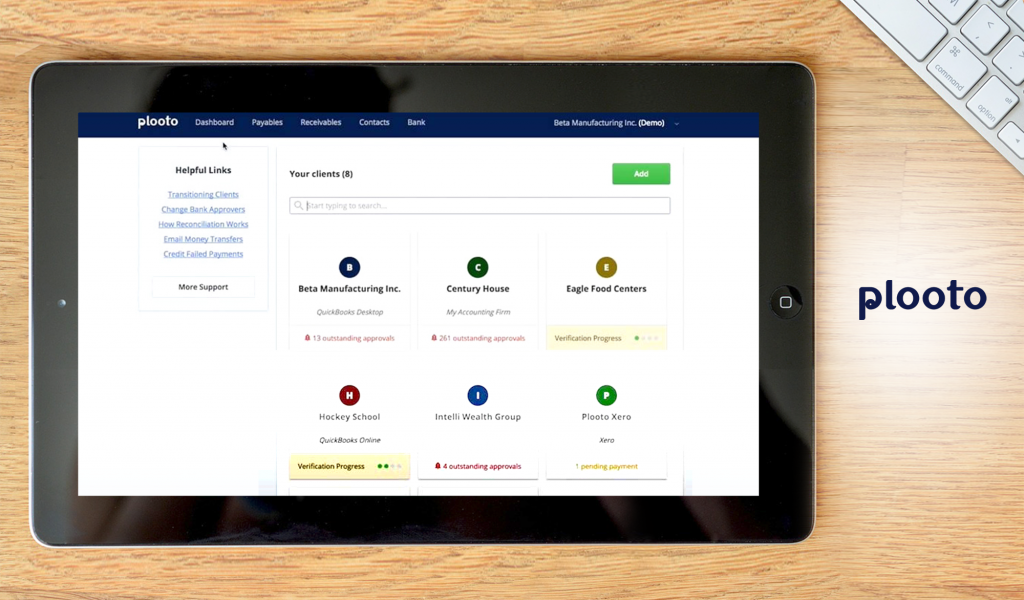
Plooto is a robust payment processing platform designed to automate the AP and AR process to facilitate better cash flow. Businesses, accountants, and bookkeepers that use this platform enjoy streamlined AP processes. Smart workflows, powerful automation, automatic reconciliation, complete audit trail, and secure payments are some of the features that make the AP process ultra-efficient.
In addition, Plooto is equally apt when it comes to getting the AR processes in order. It provides tools that simplify the work for you while delivering an exceptional experience to the client. The recurring payment and the Pre-Authorized Debit agreement options allow you to get paid with ease. Besides, it’s easy to import invoices from your accounting software and send payment requests to clients without a hassle.
Should you want to expand your options, you can also take a look at these Plooto alternatives.
Why use Plooto instead of QuickBooks?
- It offers advanced features such as the Pre-Authorized Debit (PAD) to smoothen out the payment process.
- Plooto’s customizable approval tiers allow you to assign payment approval roles to your trusted lieutenants regardless of their locations.
- Moreover, vendors don’t have to create a Plooto account to receive payments.
Why use QuickBooks instead of Plooto?
- QuickBooks facilitates better financial data synchronization which increases accounting integrity.
- It offers powerful account management and collaboration tools to help you work on data with other accountants and bookkeepers.
- In addition, QuickBooks provides support from third-party accounting professionals, but this comes at an added cost.
Detailed Plooto Review
7. Rossum

Another QuickBooks alternative is Rossum, which is a cloud-based all-in-one gateway designed to help businesses automate accounts payable, logistics, and shared services document management. Equipped with a unique cognitive data capture technology, Rossum intuitively recognizes, detects, and captures necessary data from different types of documents imported into the system. Along with its proprietary OCR tool, Rossum then extracts and transcribes the information needed for document or invoice processing.
What makes Rossum stand out from other competitors is its self-learning AI technology that enables it to instantly adjust to various modifications in the document management process based solely on user corrections. Because of this, users no longer have to continuously update the rules in order for the system to meet additional requirements.
Furthermore, Rossum integrates seamlessly with various software systems, such as ERP, RPA, and DMS to further maximize its function and optimize your business operations.
Should you want to explore more options, you can check these top Rossum alternatives.
Why use Rossum instead of QuickBooks?
- Its self-learning technology offers more convenience in adjusting to process changes.
- It has more advanced data capture technology.
- It has a more precise automated end-to-end communication.
Why use QuickBooks instead of Rossum?
- It has an on-premise option and different online versions.
- It offers more pricing options for integrating a payroll solution.
- It has more extensive financial tools.
Detailed Rossum Review
8. Tradogram
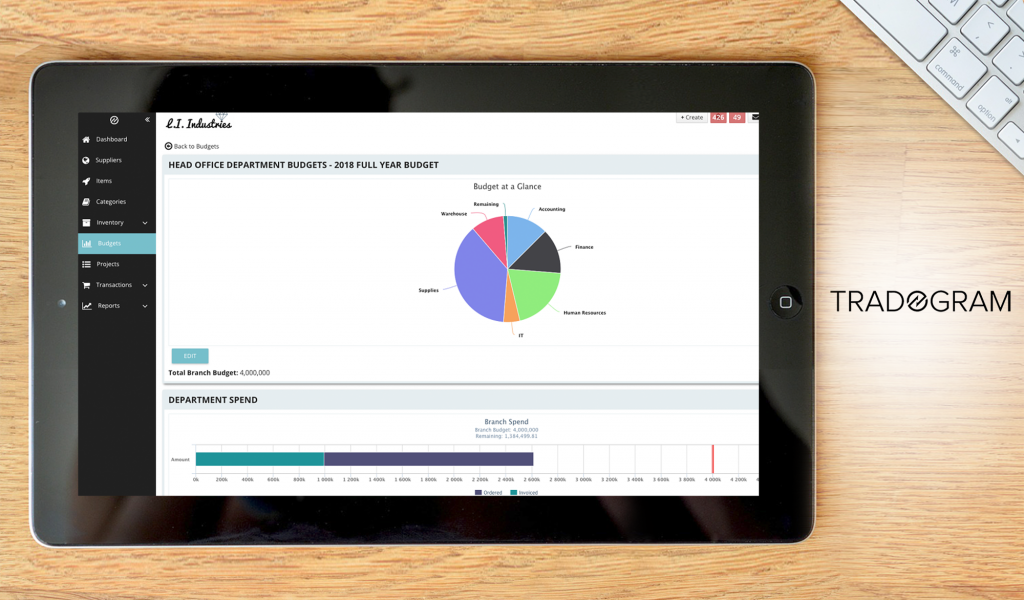
Tradogram is a powerful cloud-based solution built primarily for businesses that need to automate the purchasing process end-to-end. With Tradogram, businesses of all sizes implement cost-effective procurement management, bringing all aspects that impact the bottom line under control. It enables decision-makers to streamline all communications related to purchasing, control costs, manage suppliers, and monitor expenses, all without compromising the quality of service.
Some of its salient tools include flexible requests (RFQ and RP), internal requisitions, optimized supplier negotiations, material contracts, automated POs, AP purchasing, and delivery tracking. The tools work in unison, allowing businesses to control all stages of the procurement cycle more efficiently. The best part is that Tradogram delivers real-time updates to purchase orders, requisitions, expenses, and more. If you think this software is not a fit, you can try these Tradogram alternatives. Should you want to investigate the platform firsthand, you can easily do so by leveraging the application’s free trial offer.
Why use Tradogram instead of QuickBooks?
- Tradogram is a feature-rich procurement platform that comprises six solutions, namely strategic sourcing, purchase-to-pay, supplier management, order management, spend analysis, contract management, and supplier management.
- The solution provides real-time spend reports and updates to expenses, purchase orders, and requisitions.
- It leverages the latest cloud technology and provides top security.
Why use QuickBooks instead of Tradogram?
- QuickBooks has a flexible and scalable architecture that makes it apt for businesses of all sizes.
- It provides an advanced accounting reporting module with smart report filters.
- QuickBooks has a more advanced set of accounting tools designed to simplify and automate core accounting processes.
Detailed Tradogram Review
9. Yooz
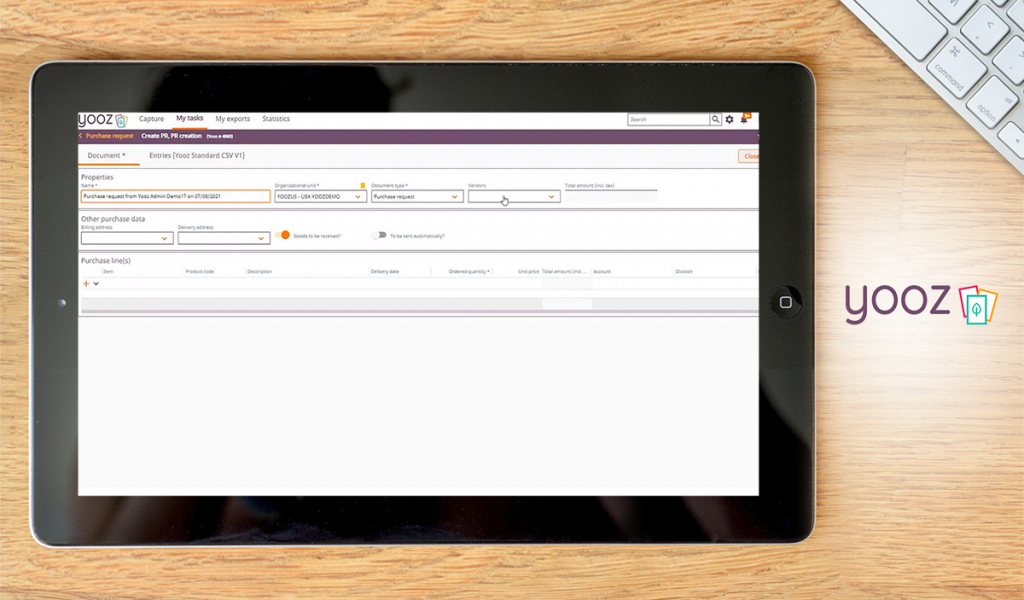
As an alternative to QuickBooks, Yooz offers a robust set of automation capabilities that streamline the accounts payable workflows. It offers customizable workflows, paperless purchase order management, and smart approvals. It even has a digital filing cabinet where you can store all your AP documents for better traceability.
The software eliminates manual data entry as well. The platform is equipped with AI-based smart data extraction which allows you to capture the information you need quickly. It also has automatic import options and a powerful search engine that simplifies data retrieval.
It also supports over 250 plug-and-play integrations. This allows users to easily implement the platform alongside their existing business system.
For more options, you may check out our list of Yooz alternatives.
Why use Yooz instead of Quickbooks?
- Yooz is powered by AI and Big Data technologies, allowing users
- It comes with built-in payment processing through YoozPay as well as a fraud detection system.
- The platform comes with omnichannel capture options.
Why use QuickBooks instead of Yooz?
- QuickBooks has a broader range of capabilities that go beyond accounts payable management.
- QuickBooks can help keep track of inventory levels.
- The report customization of QuickBooks is more advanced.
Detailed Yooz Review
10. BigTime

BigTime is a cloud-based Software-as-a-Service tool that allows professional services firms to have their time and expense tracking and their billing and invoicing system all in one platform. With BigTime, professional services firms can send accurate and timely invoices, streamline payment processing, and gain insights into their financial reporting.
Ideal users of BigTime include professional services firms like law firms, IT services, consulting firms, accounting firms, government contracting, architecture and engineering firms, and marketing and creative agencies. BigTime takes the pain of manually tracking time and expense for project-based workers while giving business owners the flexibility they need with billing and invoicing clients.
BigTime’s project accounting features are useful for professional services firms that want to eliminate manual time and expense tracking processes. With automated time tracking and smart invoicing features, firms can spend less time on administrative tasks to focus on client needs. It also allows them to cut down on the time spent on data entry and approval, speeding up their billing and invoicing workflow. With the data that they get from financial reports, firms also have a better understanding of where they stand financially.
If you want to look into other options, check out this list of BigTime alternatives.
Why Use BigTime instead of Quickbooks?
- You want accounting software that serves the professional services niche.
- You need project management features aside from the accounting capabilities of the software.
- You want a cost-effective plan for five users or less.
- You need to have DCAA-compliant timekeeping.
Why Use Quickbooks instead of BigTime?
- You want to use accounting software that’s ideal for small or growing businesses.
- You want your accounting software to be able to track sales tax.
- You want more options as you grow your business to scale.
- You want to maximize tax deductions through correct tax categorization of income and expenses.
Detailed BigTime Review
Factors to Consider When Buying an Accounting Software
Narrowing down your list of prospective accounting software can be quite tedious, especially with the plethora of quality products available on the market. To help you simplify the process, we have compiled some factors that you might want to consider when buying an accounting software:
1. Can it adapt to your current accounting process?
Whether you are already using an accounting platform or are looking to graduate from your spreadsheet system, chances are you already have an idea of what you need to carry out your accounting process. You should find an accounting system that will be able to provide you with all the aspects that you think are working for your current system as well as give you other tools to reinforce it in the future.
For this, you might want to find solutions offering a complete set of features for all your accounting tasks, preferably one with a scalable architecture and an easily configurable interface. Alternatively, you can opt for a solution that can support integrations so you can avoid dealing with bloatware.
2. Can it grow with your company?
Say, for example, you operate a t-shirt printing business from your home and are working to grow your customer base enough to open up a shop. While you could easily get away with using basic accounting tools as of the moment, it might not be able to handle your needs once your business expands.
To avoid having to replace your accounting tool every time your clientele grows, find a platform that will be able to scale to your changing needs. In short, don’t simply focus on your current needs when assessing a software but also consider your future business plans. This way, you can maximize your investment and avoid wasting time on learning a new platform.
3. Does it fall within your budget?
A product’s value for money lies in its total cost of ownership, so to truly get a good idea if a particular accounting software falls within your budget, you need to study your prospective software’s available pricing plans. Aside from looking at how much each package is, pay special attention to its inclusions and limitations.
The solutions on your list should have basic accounting functionalities such as bookkeeping and expense management and, ideally, some advanced features and industry-specific tools. It is also important to note that some vendors can only support a certain number of users and accounts, so be sure to check if it will be able to handle your requirements. Also, you might want to ask the vendor if their plans are inclusive of regular updates, customer support, and installation fees as these all add to the total cost of ownership of a product.
What is the Best QuickBooks Alternative?
Hopefully, with this list of top 10 alternatives to QuickBooks, you were able to get a better idea of what accounting system will work best for you. To sum it up, we highly recommend NetSuite ERP if you are looking for an excellent alternative to QuickBooks as it offers a similarly easy-to-use interface and comprehensive functionalities features that you’d most likely require from the best accounting software systems for businesses. From basic accounting and expense tracking to time tracking and payment processing, this software can serve as an all-in-one hub for your accounting needs. You can use all the NetSuite ERP features for free for a period of time to see if the software matches your needs. Simply sign up for its free trial to learn more.
Of course, it does have its shortcomings as well. So, should it not have the tools you need, you can always check out the other options we’ve mentioned on this list.
Key Insights
- QuickBooks Popularity: QuickBooks is a widely-used entry-level accounting solution, particularly for companies transitioning from Excel spreadsheets to more comprehensive accounting software.
- Limitations of QuickBooks: Despite its popularity, QuickBooks has limitations such as lack of industry-specific features, limited file size, and data support, making it less suitable for high-growth businesses or those with specific accounting needs.
- Importance of Emerging Technologies: Accounting professionals are increasingly investing in emerging technologies like advanced analytics, automation, AI, and IoT to meet expanding customer expectations and enhance their service offerings.
- Need for Scalable Solutions: As businesses grow, their accounting needs evolve. It is crucial to choose accounting software that can scale with business growth and adapt to changing requirements.
- Top Alternatives to QuickBooks: The article lists top alternatives to QuickBooks, including NetSuite ERP, Paychex, Tipalti, FreshBooks, AvidXchange, Plooto, Rossum, Tradogram, Yooz, and BigTime, each offering unique features and benefits.
- Key Features of Alternatives: Each alternative provides specific advantages over QuickBooks, such as advanced payroll automation, sophisticated payment processing, seamless integrations, AI-powered data capture, and comprehensive project management tools.
- Factors to Consider: When selecting accounting software, consider factors like adaptability to current processes, scalability, and total cost of ownership, including pricing plans, feature inclusions, and support services.
FAQ
- What makes QuickBooks a popular choice for businesses?
QuickBooks is popular because it offers a user-friendly interface, comprehensive accounting features, and the ability to manage multiple financial activities from a single dashboard. It is particularly favored by small to medium-sized companies transitioning from Excel spreadsheets to a more robust accounting solution.
- Why might a business consider alternatives to QuickBooks?
A business might consider alternatives to QuickBooks due to its limitations such as lack of industry-specific features, limited file size and data support, and insufficiency for high-growth businesses. Additionally, some businesses may require more specialized or advanced features that QuickBooks does not offer.
- What are some emerging technologies in accounting software?
Emerging technologies in accounting software include advanced and predictive analytics, automation (including RPA), artificial intelligence (AI), the Internet of Things (IoT), human augmentation (including wearables), natural language processing (NLP), virtual/augmented/mixed reality, and blockchain.
- How can accounting software help a business stay competitive?
Accounting software helps a business stay competitive by optimizing cash flow, monitoring expenses, and keeping accurate records of financial data. It also streamlines financial processes, reduces manual data entry, improves accuracy, and provides valuable insights for decision-making.
- What are the key benefits of using NetSuite ERP over QuickBooks?
NetSuite ERP offers more sophisticated features like vendor management, fixed asset management, and inventory control. It provides integrated accounting with other business processes such as payroll and manufacturing, making it suitable for mid-level and large enterprises. NetSuite ERP is also known for its




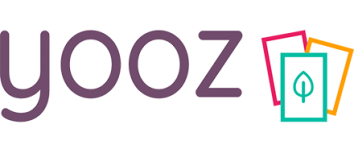























My first concern is can I import my QuickBooks data base. And I will need a multiuser mode. I have 4 users now.
Leave a comment!